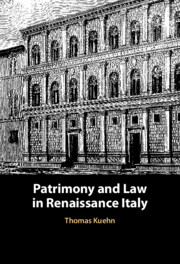Book contents
- Patrimony and Law in Renaissance Italy
- Patrimony and Law in Renaissance Italy
- Copyright page
- Contents
- Acknowledgments
- 1 Introduction
- 2 Bartolus and Family in Law
- 3 The Divisible Patrimony
- 4 Property of Spouses in Law in Renaissance Florence
- 5 Societas and Fraterna of Brothers
- 6 Fideicommissum and Law
- 7 Estate Inventories as Legal Instruments in Renaissance Italy
- 8 Prudence, Personhood, and Law in Renaissance Italy
- 9 Addendum
- 10 Conclusion
- Bibliography
- Index
1 - Introduction
Published online by Cambridge University Press: 24 February 2022
- Patrimony and Law in Renaissance Italy
- Patrimony and Law in Renaissance Italy
- Copyright page
- Contents
- Acknowledgments
- 1 Introduction
- 2 Bartolus and Family in Law
- 3 The Divisible Patrimony
- 4 Property of Spouses in Law in Renaissance Florence
- 5 Societas and Fraterna of Brothers
- 6 Fideicommissum and Law
- 7 Estate Inventories as Legal Instruments in Renaissance Italy
- 8 Prudence, Personhood, and Law in Renaissance Italy
- 9 Addendum
- 10 Conclusion
- Bibliography
- Index
Summary
In late medieval and Renaissance Italian societies, family was conceived as a quasi-corporate entity, continuing across generations. But in law ownership was conceived as an attribute of individuals, and generally of only one person in a household, the paterfamilias. Legal experts worked to accommodate legal notions to the realities of family life, which were close to what anthropologists have come to term an economy of sharing (with multiple and overlapping rights). Law thus came to provide instruments that helped perpetuate families or terminate them. It fell to the paterfamilias to manage property and use legal instruments to do so in order that the patrimony, substantia, could be transmitted to the next generation.
- Type
- Chapter
- Information
- Patrimony and Law in Renaissance Italy , pp. 1 - 18Publisher: Cambridge University PressPrint publication year: 2022

